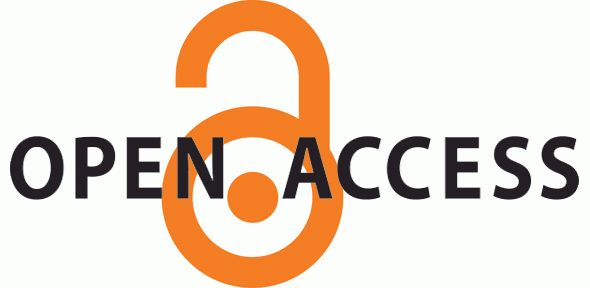
On this page:
-
Can I use the Royal Society of Chemistry's Gold for Gold scheme?
-
Where can I find out more about open access publishing in Cambridge?
What is open access?
Open access publishing means making your paper available to everyone in the world to download for free.
Open access publishing models
There are two main open access models:
1. Self-archiving ("green", University of Cambridge preferred)
-
Deposit of peer-reviewed manuscripts in an OA repository
-
Publishers often set embargo (fixed period of time before the article can be made freely available e.g. 18 months)
2. Pay to publish ("gold")
-
Free access to final published versions of articles, immediately on publication
-
Publisher requires payment of an Article Processing Charge (APC)
Why do I have to make my paper open access?
Journal articles and conference proceedings must be deposited in a suitable Open Access repository within three months of acceptance, in order to be eligible for the next REF. Please read this short and very concise presentation on Open Access and REF 2021 to find out how you should do this as a University of Cambridge author.
How do I make my paper open access?
Upload your accepted manuscript to the University repository, Apollo, via Symplectic. The Open Access team (based at Cambridge University Library) will advise you how to make your paper open access, so that you comply with the relevant publisher journal and funder open access requirements.
They might be able to arrange payment of APCs for Research England and COAF (including the Wellcome Trust) funded papers from a block grant.
They will also deposit your paper in the University's institutional repository, Apollo, (or one that your funder specifies) and will give you a DOI for it.
Can I use the Royal Society of Chemistry's Gold for Gold scheme?
This scheme ended in 2016.
Where can I find out more about open access publishing in Cambridge?
Visit the Open Access for Administrators and Librarians LibGuide. This is primarily intended for research support administrative staff and librarians, but researchers may also find it useful. This LibGuide is designed to give you an introduction to open access, including; funder policies, rights retention and current REF requirements. Each topic is covered through one or more short videos. PowerPoint slides and transcripts are available at the bottom of each video.
The University's Open Access website provides further guidance on making your papers open access. The Open Access Team have created a series of flowchart guides for researchers, administrators and librarians on their Open Access Resources website.
The Scholarly Communication website provides information about open access including individual research funders' open access policies and fees.
Members of staff from the University's Office of Scholarly Communication gave a presentation on 'Sharing your research' (covering both open access and open data) on 19th April 2016.
See also the Chemistry Library Blog posts on open access and Chemistry Library Twitter account for the latest news on open access in Cambridge and beyond.
Enrol on the Journal Article Versions Moodle site (Raven login required, then click to self enrol) to discover practical tips for: correctly describing journal article versions; recognising journal articles published open access; understanding the importance of knowing where, when and which version of a journal article can be shared in order to comply with funders' and publishers' policies, and; avoiding article-sharing pitfalls.
Visit the 'Publishing Open Access' website to find out which journals Cambridge researchers can publish in without charge, because they are part of "read and publish" or "transformative" agreements with publishers. You can look up a journal by following the 'Read & Publish journals' link on the left-hand side menu. The 'Discounts and offsets' page shows which schemes and memberships that the university has entered into with publishers to reduce the cost of publishing open access e.g. ACS, RSC. The 'How much do publishers charge for open access?' page shows the fees.
What is Plan S?
Plan S is a manifesto for full and immediate Open Access set out by a coalition of research funders, including UKRI and the Wellcome Trust. Plan S has one goal (full and immediate Open Access to publicly funded research outputs) and ten supporting principles. The key principle is: "After 1 January 2020 scientific publications on the results from research funded by public grants provided by national and European research councils and funding bodies, must be published in compliant Open Access Journals or on compliant Open Access Platforms."
The Office of Scholarly Communication has created a Plan S website which provides much more detail about Plan S, and includes a link to the University's response to it. It has also has created a web page for Plan S FAQs. This will be expanded as more information is available.
You can use the Journal Checker Tool provided by cOAlition S to authors to support them in finding Plan S compliant "routes" through which to publish their articles. The tool allows an author to enter the name of a funder, an institution and the journal to which they plan to submit an article, and checks if this combination of funder, institution and journal offers any route to compliance with Plan S.
Open Research at the University
The University of Cambridge Open Research Position Statement summarises the University’s approach to Open Research. It sets out key principles for the conduct and support of Open Research at the University. The Statement can be found here: https://osc.cam.ac.uk/open-research/open-research-position-statement.
The University of Cambridge is now a signatory of DORA (San Francisco Declaration on Research Assessment), a set of recommendations agreed in 2012 that seek to ensure that the quality and impact of research outputs are "measured accurately and evaluated wisely".
Research Support Handy Guides
These have been produced by the University's Office of Scholarly Communication and are available for free here. They cover publication, data management, open access, copyright, metrics, and promoting research.
